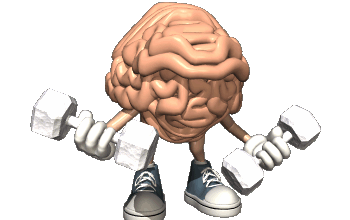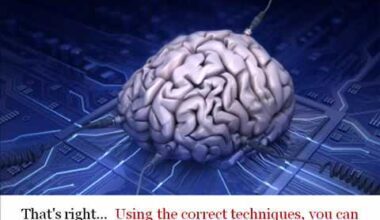It’s not just brain exercises that help with memory improvement. Physical exercise can also increase your brain cells.
As we age the hippocampus area in the brain starts to shrink. The hippocampus plays an important role in the processing of imformation from short-term to long-term memory. Shrinkage in this area of the brain leads to development of dementia.
A study by the Proceedings of the National Academy of Science, (the official journal of the United States National Academy of Sciences) found those who exercise on a regular basis, and don’t spend too much time in front of a computer or television, are not only physical fit, but mentally as well. The study found the hippocampus actually begins to grow with exercise — increasing the size of the brain and reversing any mental decline, which can add years to your life.
When the oxygen level of your blood is low you are not able to concentrate. Exercise can give you an oxygen boost, allowing the blood to flow faster to the brain. Beginning exercise, even for those who are normally out of shape, can improve memory test scores.
A Columbia University study took 46 mice and divided them into two groups. Twenty-three mice were given a wheel in their cages while the other 23 has no exercise equipment at all. Those with the wheels needed no encouragement to exercise, they just did it. A dye injection was made at the end of two and four weeks, showed new cell growth in the mice who exercised, and more blood flow to the hippocampus region.
After this study with the mice the attention was turned to their human counterparts. Eleven healthy men, between the ages of 21-45, were given memory and aerobic fitness tests, and an MRI (Magnetic Resonance Imaging) brain scan. Each was to work out for one hour, four times a week for three months. The program called for them to do five minutes of workout on the Columbia University fitness center on a treadmill or stationary bike; a five minute stretch; 40 minutes on a treadmill, elliptical trainer or stair machine; then cool down and stretch for 10 minutes.
At the end of the three months they were given the same MRI, fitness and memory tests again. The results showed an increase in blood flow to the hippocampus regions of the brain, improvement in physical fitness, and increased scores on the memory tests.
“When you add it all up,” says researcher Scott Small, MD, “You’ve got a good reason to get moving.” “I, like many physicians, already encourage my patients to get active, and this adds yet another reason to the long list of reasons why exercise is good for overall health,” Small says.
Fitness expert Robert Sweetgall explains: “If you don’t exercise regularly, try starting with a simple cardio program at home. You might want to check out the 20-Minute Memory Solution exercise program that I personally use. It really works!”
You can’t lose if you exercise, no matter when you start. It not only helps your body — but you can improve your memory functions as well.
This lesson was shared by two time USA Memory Champion and memory speaker Ron White.
Resources:
Memory-Improvement-Tips.com — Exercise and Memory: http://www.memory-improvement-tips.com/exercise.html
WebMD.com — Get Fit, Improve Memory — Exercise May Boost Memory Through Brain Blood Flow and New Brain Cells: http://www.webmd.com/fitness-exercise/news/20070313/get-fit-improve-memory



